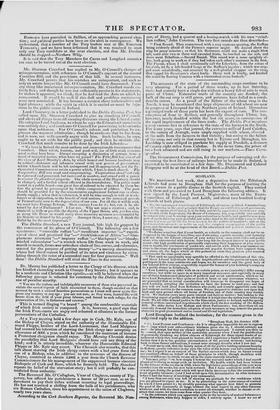The accounts of the state of the outstanding crops continue
to be very alarming. For a period of three weeks, up to last Saturday, there had scarcely been a single day without a heavy fall of rain in most parts of Ulster. Extensive tracts of the country are flooded; the bulk of the oat crop is still green, and potatoes have failed to a consi- derable extent. As a proof of the failure of the wheat crop in the North, it may be mentioned that large shipments of old wheat are now in progress at Liverpool for the Northern parts of Ireland. Heretofore a principal trade of those parts has been the export of corn. The con- sumption of flour in Belfast, and generally throughout Ulster, has, however, nearly doubled within the last six years, in consequence of the rapid improvement of the linen trade. The Dublin Post mentions a very curious fact in reference to the state of the harvest in the North. Fur many years, says that journal, the extensive mills of Lord Caledon, in the county of Armagh, were amply supplied with wheat, slivered at the mills from the farmers in that vicinity ; but owing to the failure of time crop, not only in that county but in Tyrone and Monaghan, his Lordship is now obliged to purchase his supply at Dundalk, a distance of twenty-eight miles from Caledon. In the mean time, the prices of cora have advanced and are still rising in our markets.— Times Corre- spondent.
The Government Commission, for the purpose of surveying and de- termining the best lines of railways hereafter to be made in Ireland, is expected to be constituted in a few days. Mr. Drummond and Colonel Burgoyne will be at the head of that Board.—Dublin Post.


























 Previous page
Previous page